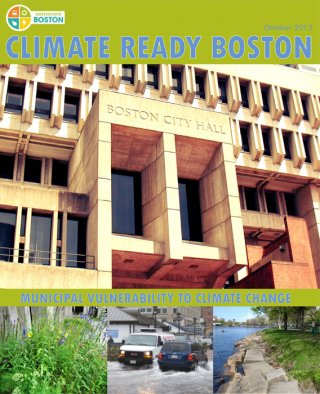The City of Boston Plans for Adaptation

In 2007, Boston’s Mayor directed each city department to assess their risks and vulnerabilities from a changing climate. In the subsequent years Boston developed a report “Climate Ready Boston - Municipal Vulnerability to Climate Change,” that anticipates climate impacts to, and vulnerabilities for, the city of Boston. The Climate Ready Boston Adaptation Plan projects how climate change is expected to lead to impacts ranging from sea level rise to extreme weather events. The report utilized existing research and analysis to identify potential municipal infrastructure and other city services that could be impacted by climate change. Boston used the knowledge gained from Climate Ready Boston to integrate the climate risks and vulnerabilities within their Natural Hazard Mitigation Plan.
- Climate Ready Boston Adaptation Plan (PDF) (199 pp, 177 MB, About PDF)
| How Did They Do It? | Applicable EPA Tools |
|---|---|
Mayor issued an Executive Order to identify and plan to reduce climate risks
|
The National Climate Assessment Regional Chapters and Local Government Climate Adaptation Training can help you identify regional climate risks and how they may impact local community services. |
City departments conducted vulnerability assessments
|
The Climate Change Adaptation Workbook can help community organizations that manage environmental resources prepare a broad, risk-based adaptation plan. |
Boston used the vulnerability assessments to inform community plans
|
View the U.S. Climate Resilience Toolkit to learn more about VCAPS and other tools to help communities integrate vulnerabilities into community plans. |
Similar Cases and More Information
Determining climate risk and vulnerability is just the first step to adapting to climate change. Communities also need to identify and employ adaptation strategies as well. To see how Boston adapted its wastewater treatment facility to sea level rise, view the Deer Island example.
